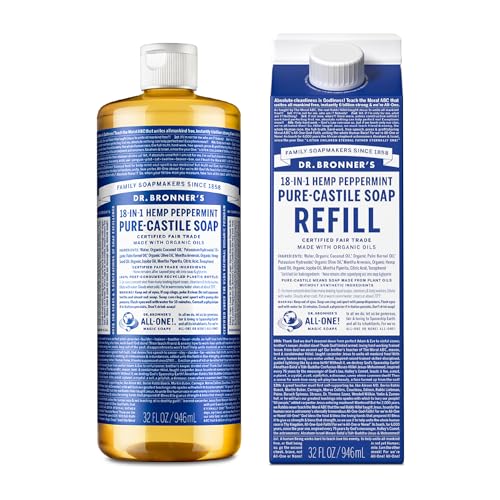
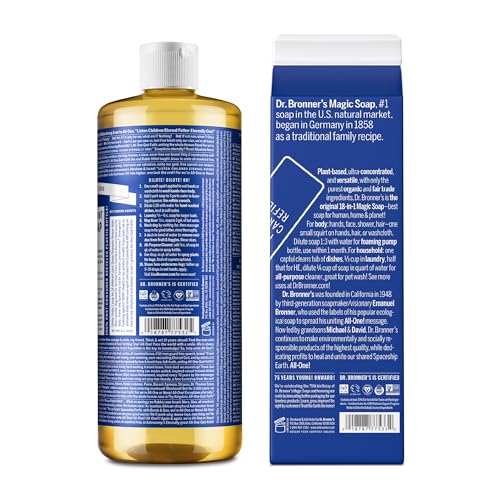
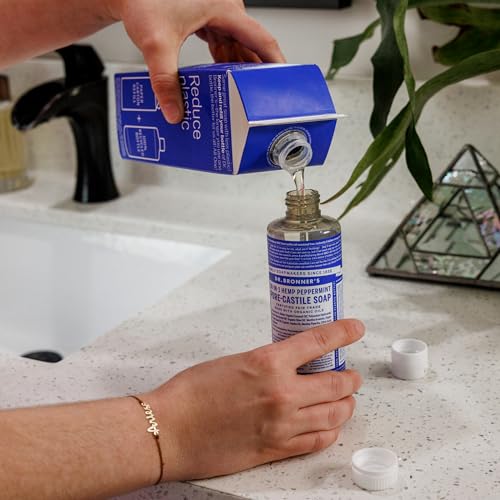
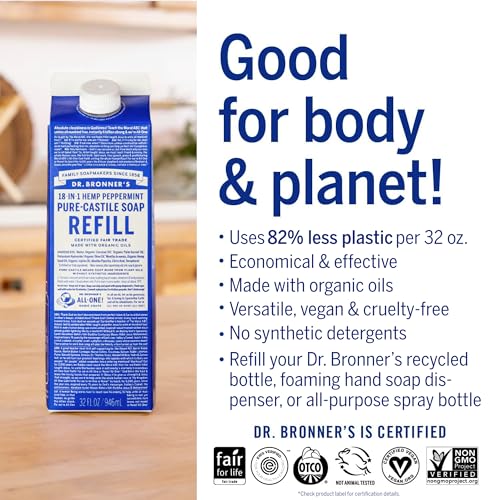
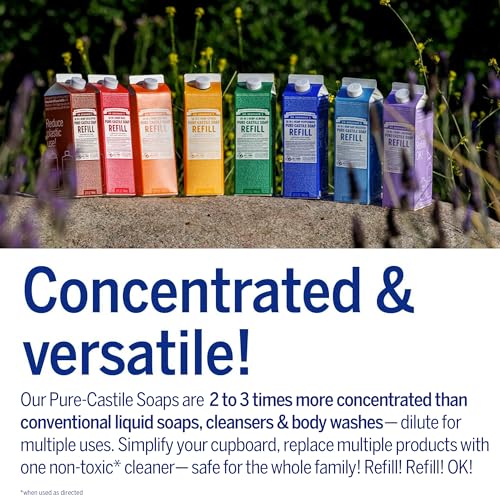
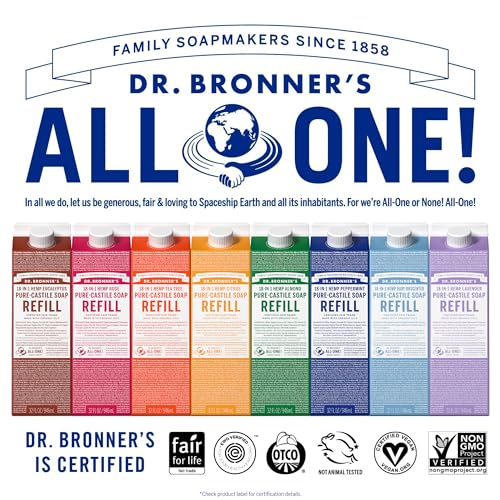
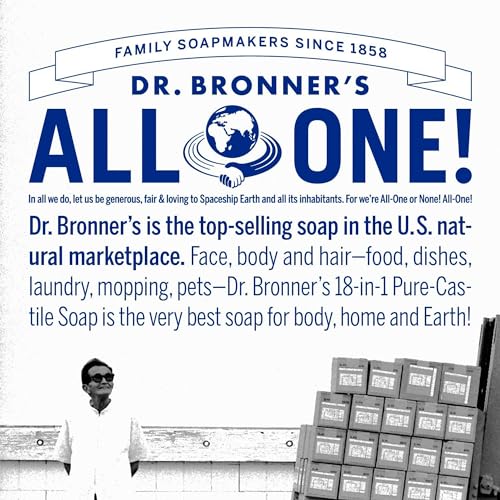
Dr. Bronner's Pure-Castile Liquid Soap - Certified Organic, 82% Less Plastic, Peppermint - 32oz


Potassium Hydroxide
High RiskPotassium hydroxide is a caustic inorganic base commonly used in various products for its ability to adjust pH levels and act as a cleaning agent. It is highly soluble in water and can produce heat upon dissolution, making it effective in certain formulations.
Sustai Insights
Potassium hydroxide serves as a strong pH adjuster and cleaning agent, but it poses significant health risks due to its caustic nature, which can cause irritation to skin and eyes. Environmental concerns include its potential to contribute to water pollution. Regulatory bodies have imposed strict usage restrictions due to these hazards, leading to a high-risk overall assessment. Safe handling practices are essential, and alternatives such as citric acid may provide safer pH adjustment without the associated risks.
Mentha Arvensis
High RiskMentha arvensis, commonly known as wild mint, is a plant species used for its aromatic properties and as a flavoring agent in food and personal care products. It is known for its cooling sensation and is often included in formulations for its fragrance and potential soothing effects.
Sustai Insights
Mentha arvensis offers functional benefits as a natural fragrance and potential skin soothing agent. However, it has a high allergenic potential, which may lead to skin irritation or allergic reactions in sensitive individuals. Environmental risks include possible contributions to pollution, but it is not classified as bioaccumulative. Regulatory assessments indicate it is not currently restricted, although caution is advised due to allergy concerns. Overall, the risk level for this ingredient is assessed as high, necessitating careful consideration of usage and alternatives.
Cannabis Sativa (Hemp) Extract
High RiskCannabis sativa (hemp) extract is derived from the hemp plant, primarily used for its potential therapeutic properties. It contains various cannabinoids, flavonoids, and terpenes, which may contribute to its functional benefits in cosmetic and wellness products. The extract is often sought for its calming and anti-inflammatory effects.
Sustai Insights
Cannabis sativa (hemp) extract offers functional benefits such as anti-inflammatory properties and potential skin-soothing effects. It is derived from sustainably sourced hemp, contributing to its appeal. However, there are health risks associated with its use, including low concerns for carcinogenicity and neurotoxicity. Regulatory restrictions exist in certain jurisdictions, marking it as high risk overall. Safe usage should be practiced, particularly in sensitive applications, and alternatives like hemp seed oil may be considered for specific uses.
Citric Acid
Medium RiskCitric acid is an alpha hydroxy acid used in personal care products primarily for its role as a pH adjuster and natural preservative. It occurs naturally in citrus fruits and is commonly utilized in various formulations for its chelating properties and mild exfoliation benefits.
Sustai Insights
Citric acid offers functional benefits as an effective preservative and pH stabilizer, contributing to product longevity and stability. It is biodegradable and derived from renewable sources. Health risks are low, with minimal concerns regarding carcinogenicity, allergies, and reproductive toxicity. However, moderate use restrictions exist due to potential irritation at high concentrations. Environmental risks are limited, as citric acid is not known to accumulate in ecosystems. Regulatory agencies have no significant advisories against its use. Overall, it is assessed as a medium-risk ingredient, with safe usage practices recommended and alternatives available.
Simmondsia Chinensis (Jojoba)
Low RiskSimmondsia chinensis, commonly known as jojoba, is an oil derived from the seeds of the jojoba plant. It is commonly used in cosmetic formulations for its moisturizing properties, acting as an emollient and skin conditioning agent.
Sustai Insights
Jojoba oil offers functional benefits such as effective skin moisturization and is biodegradable, with sustainable sourcing practices. Health risks are low, with minimal concerns regarding carcinogenicity, allergies, and reproductive toxicity. Environmental impact is negligible, with no pollutant or bioaccumulation potential. Regulatory status is favorable with no significant restrictions noted. Overall, it is assessed as low risk, and safe usage practices should be maintained. Alternatives include other plant-derived oils like argan or almond oil, which may provide similar benefits.
Gaultheria Procumbens (Wintergreen) Leaf Extract
Low RiskGaultheria procumbens (wintergreen) leaf extract is derived from the leaves of the wintergreen plant. This extract is commonly used in personal care products for its potential soothing properties and characteristic fragrance. It is often included in formulations for its aromatic qualities and may contribute to product stability.
Sustai Insights
Gaultheria procumbens leaf extract is recognized for its functional benefits, including soothing properties and pleasant scent. It is sustainably sourced and shows low health risk concerns, with negligible potential for carcinogenicity, allergies, or reproductive toxicity. Regulatory assessments indicate it is not currently restricted. Environmental impact appears minimal, with no significant pollution or bioaccumulation concerns. Overall, this ingredient is considered low risk, making it a suitable choice in formulations. For those seeking alternatives, other botanical extracts may provide similar benefits.
Tocopherol, D Alpha
Low RiskTocopherol, specifically d-alpha tocopherol, is a naturally occurring form of Vitamin E. It is commonly used in cosmetic and personal care products primarily for its antioxidant properties, helping to protect formulations from oxidation and extend shelf life.
Sustai Insights
D-alpha tocopherol provides effective antioxidant benefits, contributing to product stability. It is sustainably sourced and generally regarded as safe, with low concerns regarding carcinogenicity, allergies, and reproductive toxicity. However, there are minor concerns about endocrine disruption. Regulatory bodies have not imposed significant restrictions, indicating low overall risk. Recommended usage practices include adhering to established safe concentration thresholds. Alternatives, such as other forms of Vitamin E or plant-based antioxidants, may also be considered.
Water
Low RiskWater is a clear, colorless liquid essential for various biological processes. It serves as a solvent in formulations, facilitating the dissolution of other ingredients and enhancing product texture and application. Additionally, water plays a crucial role in hydration and is a key component in many cosmetic and personal care products.
Sustai Insights
Water is an effective solvent and hydrator, contributing to the texture and efficacy of formulations. It is biodegradable and generally regarded as safe, with low concerns regarding carcinogenicity, allergies, and reproductive toxicity. However, excessive water usage can lead to environmental concerns, particularly regarding resource depletion. Regulatory bodies do not impose restrictions on water use in cosmetics. Overall, the risks associated with water are low, making it a safe and essential ingredient.
Cocos Nucifera (Coconut) Oil
Low RiskCocos Nucifera (Coconut) Oil is derived from the kernels of the coconut palm. It is primarily used in cosmetic formulations for its emollient and moisturizing properties, making it suitable for skin and hair care products.
Sustai Insights
Coconut oil serves as an effective moisturizer and emollient, promoting skin hydration and softness. It is sustainably sourced and biodegradable. Health risks are minimal, with low concerns regarding carcinogenicity, allergens, and reproductive toxicity. Environmental impact is also low, as it does not contribute significantly to pollution or bioaccumulation. Regulatory bodies have not issued restrictions on its use. Overall, coconut oil presents a low risk for health and environmental concerns, making it a safe ingredient in cosmetic products.
Simmondsia Chinensis (Jojoba)
Low RiskSimmondsia chinensis, commonly known as jojoba, is an oil derived from the seeds of the jojoba plant. It is commonly used in cosmetic formulations for its moisturizing properties, acting as an emollient and skin conditioning agent.
Sustai Insights
Jojoba oil offers functional benefits such as effective skin moisturization and is biodegradable, with sustainable sourcing practices. Health risks are low, with minimal concerns regarding carcinogenicity, allergies, and reproductive toxicity. Environmental impact is negligible, with no pollutant or bioaccumulation potential. Regulatory status is favorable with no significant restrictions noted. Overall, it is assessed as low risk, and safe usage practices should be maintained. Alternatives include other plant-derived oils like argan or almond oil, which may provide similar benefits.
Gaultheria Procumbens (Wintergreen) Leaf Extract
Low RiskGaultheria procumbens (wintergreen) leaf extract is derived from the leaves of the wintergreen plant. This extract is commonly used in personal care products for its potential soothing properties and characteristic fragrance. It is often included in formulations for its aromatic qualities and may contribute to product stability.
Sustai Insights
Gaultheria procumbens leaf extract is recognized for its functional benefits, including soothing properties and pleasant scent. It is sustainably sourced and shows low health risk concerns, with negligible potential for carcinogenicity, allergies, or reproductive toxicity. Regulatory assessments indicate it is not currently restricted. Environmental impact appears minimal, with no significant pollution or bioaccumulation concerns. Overall, this ingredient is considered low risk, making it a suitable choice in formulations. For those seeking alternatives, other botanical extracts may provide similar benefits.
Tocopherol, D Alpha
Low RiskTocopherol, specifically d-alpha tocopherol, is a naturally occurring form of Vitamin E. It is commonly used in cosmetic and personal care products primarily for its antioxidant properties, helping to protect formulations from oxidation and extend shelf life.
Sustai Insights
D-alpha tocopherol provides effective antioxidant benefits, contributing to product stability. It is sustainably sourced and generally regarded as safe, with low concerns regarding carcinogenicity, allergies, and reproductive toxicity. However, there are minor concerns about endocrine disruption. Regulatory bodies have not imposed significant restrictions, indicating low overall risk. Recommended usage practices include adhering to established safe concentration thresholds. Alternatives, such as other forms of Vitamin E or plant-based antioxidants, may also be considered.
Water
Low RiskWater is a clear, colorless liquid essential for various biological processes. It serves as a solvent in formulations, facilitating the dissolution of other ingredients and enhancing product texture and application. Additionally, water plays a crucial role in hydration and is a key component in many cosmetic and personal care products.
Sustai Insights
Water is an effective solvent and hydrator, contributing to the texture and efficacy of formulations. It is biodegradable and generally regarded as safe, with low concerns regarding carcinogenicity, allergies, and reproductive toxicity. However, excessive water usage can lead to environmental concerns, particularly regarding resource depletion. Regulatory bodies do not impose restrictions on water use in cosmetics. Overall, the risks associated with water are low, making it a safe and essential ingredient.
Potassium Hydroxide
High RiskPotassium hydroxide is a caustic inorganic base commonly used in various products for its ability to adjust pH levels and act as a cleaning agent. It is highly soluble in water and can produce heat upon dissolution, making it effective in certain formulations.
Sustai Insights
Potassium hydroxide serves as a strong pH adjuster and cleaning agent, but it poses significant health risks due to its caustic nature, which can cause irritation to skin and eyes. Environmental concerns include its potential to contribute to water pollution. Regulatory bodies have imposed strict usage restrictions due to these hazards, leading to a high-risk overall assessment. Safe handling practices are essential, and alternatives such as citric acid may provide safer pH adjustment without the associated risks.
Cocos Nucifera (Coconut) Oil
Low RiskCocos Nucifera (Coconut) Oil is derived from the kernels of the coconut palm. It is primarily used in cosmetic formulations for its emollient and moisturizing properties, making it suitable for skin and hair care products.
Sustai Insights
Coconut oil serves as an effective moisturizer and emollient, promoting skin hydration and softness. It is sustainably sourced and biodegradable. Health risks are minimal, with low concerns regarding carcinogenicity, allergens, and reproductive toxicity. Environmental impact is also low, as it does not contribute significantly to pollution or bioaccumulation. Regulatory bodies have not issued restrictions on its use. Overall, coconut oil presents a low risk for health and environmental concerns, making it a safe ingredient in cosmetic products.
Mentha Arvensis
High RiskMentha arvensis, commonly known as wild mint, is a plant species used for its aromatic properties and as a flavoring agent in food and personal care products. It is known for its cooling sensation and is often included in formulations for its fragrance and potential soothing effects.
Sustai Insights
Mentha arvensis offers functional benefits as a natural fragrance and potential skin soothing agent. However, it has a high allergenic potential, which may lead to skin irritation or allergic reactions in sensitive individuals. Environmental risks include possible contributions to pollution, but it is not classified as bioaccumulative. Regulatory assessments indicate it is not currently restricted, although caution is advised due to allergy concerns. Overall, the risk level for this ingredient is assessed as high, necessitating careful consideration of usage and alternatives.
Cannabis Sativa (Hemp) Extract
High RiskCannabis sativa (hemp) extract is derived from the hemp plant, primarily used for its potential therapeutic properties. It contains various cannabinoids, flavonoids, and terpenes, which may contribute to its functional benefits in cosmetic and wellness products. The extract is often sought for its calming and anti-inflammatory effects.
Sustai Insights
Cannabis sativa (hemp) extract offers functional benefits such as anti-inflammatory properties and potential skin-soothing effects. It is derived from sustainably sourced hemp, contributing to its appeal. However, there are health risks associated with its use, including low concerns for carcinogenicity and neurotoxicity. Regulatory restrictions exist in certain jurisdictions, marking it as high risk overall. Safe usage should be practiced, particularly in sensitive applications, and alternatives like hemp seed oil may be considered for specific uses.
Citric Acid
Medium RiskCitric acid is an alpha hydroxy acid used in personal care products primarily for its role as a pH adjuster and natural preservative. It occurs naturally in citrus fruits and is commonly utilized in various formulations for its chelating properties and mild exfoliation benefits.
Sustai Insights
Citric acid offers functional benefits as an effective preservative and pH stabilizer, contributing to product longevity and stability. It is biodegradable and derived from renewable sources. Health risks are low, with minimal concerns regarding carcinogenicity, allergies, and reproductive toxicity. However, moderate use restrictions exist due to potential irritation at high concentrations. Environmental risks are limited, as citric acid is not known to accumulate in ecosystems. Regulatory agencies have no significant advisories against its use. Overall, it is assessed as a medium-risk ingredient, with safe usage practices recommended and alternatives available.
Experience the refreshing power of Dr. Bronner's Pure-Castile Liquid Soap, a versatile body soap made with Regenerative Organic Certified oils. This eco-conscious formula is perfect for health-conscious consumers seeking sustainability without compromising quality.
- Regenerative Organic Certification: Crafted with the highest standards of organic farming, promoting soil health and social fairness.
- Fair Trade Ingredients: Sustainably sourced coconut and palm oils support local communities and ensure ethical farming practices.
- No Synthetic Additives: Contains only plant-based ingredients—free from preservatives and foaming agents, making it gentle for skin and the planet.
- Concentrated Formula: 2-3 times more concentrated than typical soaps, offering 18-in-1 uses including face wash and hand soap, reducing packaging waste.
- Biodegradable: Formulated to be readily biodegradable, it supports a cleaner environment while using organic, vegan components.
With Dr. Bronner's, consumers can enjoy a clean conscience knowing they are choosing a product that cares for both their health and the planet.
Subscribe & Save with Sustai
- Best Price Guarantee: Always enjoy the lowest prices on sustainable home essentials.
- No Surprises: We’ll notify you before shipping. No hidden fees, ever.
- You’re in Charge: Change, pause, or cancel your subscription anytime with ease.
- Eco-Friendly Deliveries: Our grouped shipments mean less packaging and lower emissions.
Join us on a sustainable journey. Special offers for a limited time! Prices and promotions may change.
Recommended Products
Experience the refreshing power of Dr. Bronner's Pure-Castile Liquid Soap, a versatile body soap made with Regenerative Organic Certified oils. This eco-conscious formula is perfect for health-conscious consumers seeking sustainability without compromising quality.
- Regenerative Organic Certification: Crafted with the highest standards of organic farming, promoting soil health and social fairness.
- Fair Trade Ingredients: Sustainably sourced coconut and palm oils support local communities and ensure ethical farming practices.
- No Synthetic Additives: Contains only plant-based ingredients—free from preservatives and foaming agents, making it gentle for skin and the planet.
- Concentrated Formula: 2-3 times more concentrated than typical soaps, offering 18-in-1 uses including face wash and hand soap, reducing packaging waste.
- Biodegradable: Formulated to be readily biodegradable, it supports a cleaner environment while using organic, vegan components.
With Dr. Bronner's, consumers can enjoy a clean conscience knowing they are choosing a product that cares for both their health and the planet.

You can have at most 2 Sustainable Steals products in your cart
Customer Reviews
Customers’ View
Customers appreciate the effectiveness and eco-friendly nature of this body soap, often highlighting its refreshing peppermint scent and high-quality organic ingredients. Many users mention the soap's versatility, noting it can be used for various purposes, including body wash, bubble bath, and household cleaning. Positive feedback emphasizes its biodegradable formula, which aligns with health-conscious values, as well as the gentle, skin-softening qualities that leave users feeling clean and refreshed. However, some customers have experienced issues with leakage during shipping. Overall, this product is recognized for its value and commitment to sustainable practices, making it a favored choice among eco-conscious consumers.
AI-generated from the text of customer reviewsThis product is rated 5.0 of 5.0 stars.
It has received 9 reviews.




